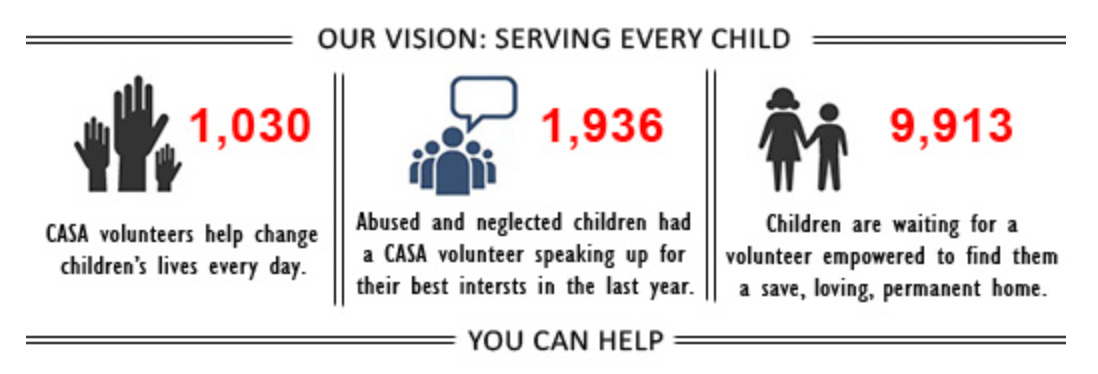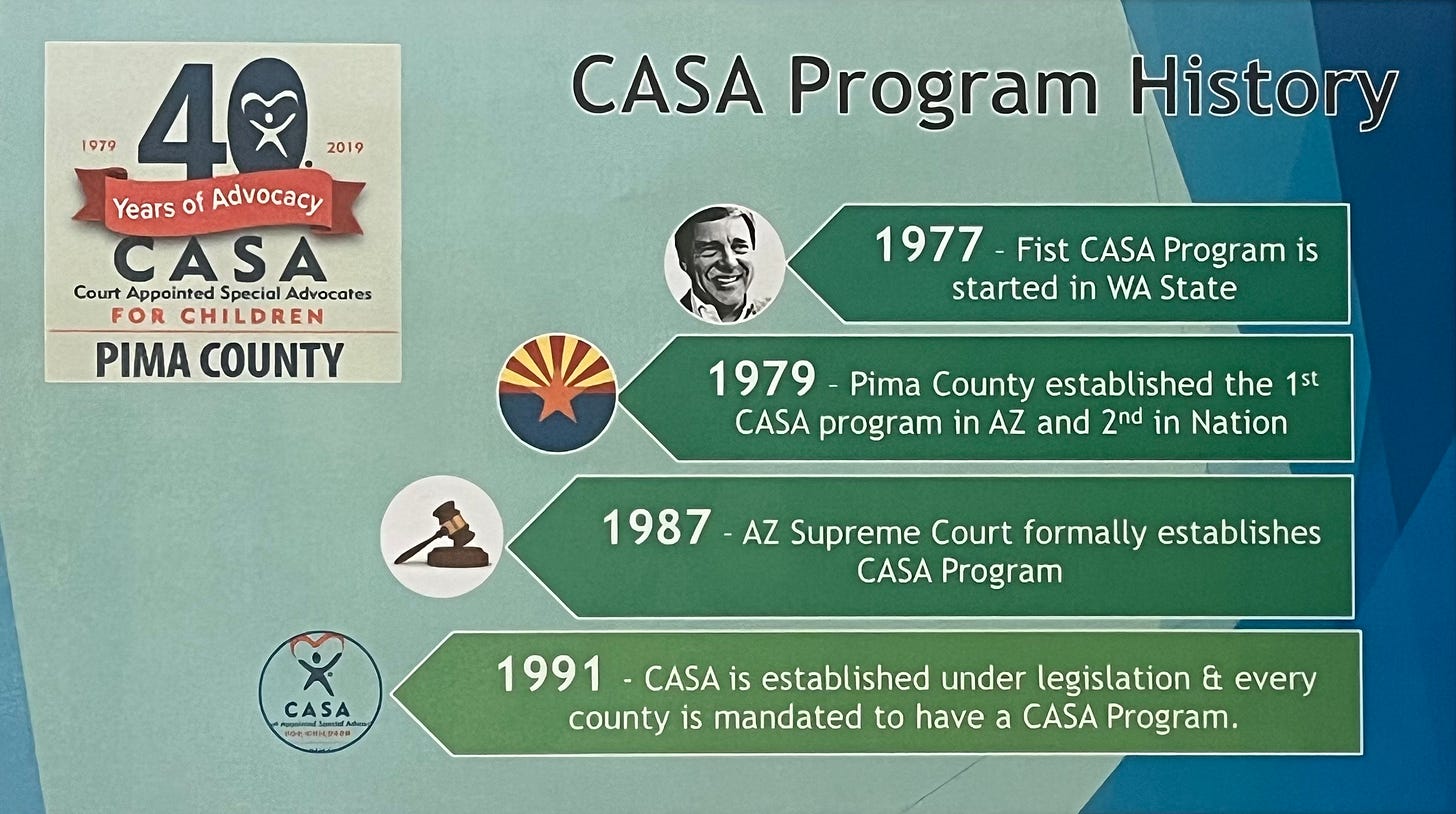The Daily Solution: Filling a gap in the system
Kids in the foster care system need a trusted adult … A Pima County court program trains volunteers to be that person … Hear from candidates for Bronson's seat.
For many kids and teens in the foster care system, stability can be hard to come by.
Some spend years going through the court process, landing in more than one home and working with several different attorneys and case workers before their case reaches resolution or they turn 18.
With all of these changes on top of the stress of being away from their parents, a trusted adult can go a long way towards making these young people feel safe.
For more than 40 years, CASA of Pima County has been training community members to be that trusted adult and help inform the legal process as Court Appointed Special Advocates.
But not enough kids have access to the program and they need more volunteers. With about 200 CASAs in Pima County versus 2,400 children in foster care, only 8% of children are benefitting from this invaluable support.
CASAs are volunteers who spend time getting to know the youth they’re appointed to serve, interviewing people in their lives and providing reports to the judge to help make the best decision for the child.
Advocates make sure the child receives services, like substance abuse counseling, therapy, and medical and educational support, until the case is closed and the child is in a permanent home.
Pima County’s juvenile court judges say CASAs are invaluable and provide them with a holistic view of the child and his or her life.
A CASA’s main role is to advocate for the child and help recommend the best possible outcome for that child’s future. They visit regularly with the kids and teens in their care, earning their trust and speaking up on their behalf. CASAs write reports that are sent to the judge and are encouraged to attend hearings.
CASA of Pima County is affiliated both with CASA of Arizona and the National CASA Association, which handles the year-round training and recruitment of volunteers. Six new advocates graduated earlier this month and the next set of virtual and in-person trainings start in just a few weeks (the virtual flex training starts Jan. 3 and the in-person academy on Jan. 18.)1
Volunteers must be at least 21 years old and go through a background check and polygraph before they can begin the 30 hours of training. CASAs spend about 15 hours a month with the child or teen they’re appointed to serve and usually only have one case at a time, although that case can last for years.
“The program itself is tried and true,” said Presiding Judge of Juvenile Court Michael Butler. “Lawyers change, case managers change all the time and placements change. They don’t provide the same voice for the child that a CASA usually does. They fill in a gap that’s hard to see.”
Butler said that CASAs provide a perspective that can’t be found anywhere else. By being the one constant adult in the child’s life during a tumultuous time, CASAs are able to earn the child’s trust and gather information that might not otherwise come out.
Annette Weneck has been a CASA for 11 years now and has worked with 12 teenagers in that time. A foster parent herself, Weneck worked with a person in a similar role while she was going through the court process to adopt her children in Washington state.
When Weneck’s youngest child started high school, she learned about the CASA program in Pima County and felt compelled to get involved.
“They were super helpful in getting my kids,” she said.
A mom to three teenagers at the time, Weneck thought that working with teens in the program would be a good fit. She was right, although it hasn’t always been easy.
“Most of them weren’t eligible for adoption, so they had to age out. And watching them age out is painful,” she said. “I stay in touch with a lot of the kids. Even though I’m not their CASA anymore, we’ve developed relationships.”
Weneck shared several of her success stories of teens who were headed down a bad path and turned their lives around.
“That’s why I continue to do it, even when the cases are hard,” she said.

Since 1985, CASAs have worked with more than 23,000 youth in Arizona, but the need for more volunteers is never-ending and the number of children represented by a CASA has remained at about 8% for years, said CASA of Pima County Program Supervisor Stephanie Chavez.
“We keep staying at about that number and it’s really hard to move it,” she said. “It’s just not your normal volunteer role. You could be on the case for two or more years.”
While the volunteer base used to consist mostly of retirees, that changed as a result of the pandemic, which Chavez said allowed the program to flourish, after many people began working from home and court hearings were moved online, along with the CASA volunteer training.
While some of those volunteers dropped off when the world opened back up, CASA has still been able to continue to recruit working professionals and college students studying related fields.
“There’s more awareness (of the program,)” she said. “We’re starting to see a more diverse pool of volunteers, which is really nice.”
But the program is a long way off from having enough volunteers, with Butler saying that in a perfect world, every child would have a CASA. While everyone who works on the case is well-meaning, they have multiple cases and just don’t have the time to get to know the child the way a CASA can.
“It’s the personal side,” Chavez said. ”They help the judge understand more about who this child is.”
UA official out: The University of Arizona’s chief financial officer, Lisa Rulney, resigned Wednesday amid an ongoing financial crisis, the Arizona Daily Star’s Ellie Wolfe reports. UA President Robert C. Robbins told the Arizona Board of Regents at their meeting Wednesday that he accepted her resignation, while also ending strategic initiatives funding, freezing hiring and compensation, and reducing financial aid for out-of-state students.
Straight from the source: The candidates vying to fill the seat of former Pima County Supervisor Sharon Bronson, who retired last month, spoke at a forum on Monday organized by the League of Women Voters of Greater Tucson. The county supervisors are planning to appoint Bronson’s replacement on Dec. 19.
Take another look: A pair of bills to repeal rent caps and prevent excessive rent increases that have sat untouched since January should be reconsidered by the state legislature, UA student Lauren Taylor writes in an opinion piece for the Arizona Daily Star. Taylor, who Caitlin spoke with at Tuesday’s Tucson Poverty Project community forum, writes that the only way to help housing stay affordable is to continuously advocate for policies like these.
“This is a step in the right direction to help keep housing affordable here in Pima County,” Taylor wrote. “I firmly believe that housing is a human right, and ensuring its affordability keeps our people safe.”
That’s one way to do it: To deal with the housing shortage, a program in Bisbee is renovating houses and selling them for 20% below market value, Arizona Public Media’s Summer Hom reports. The City of Bisbee partnered with Southeast Arizona Renovations, LLC, and the nonprofit Step Up Bisbee Naco to take abandoned buildings and turn them into affordable housing. To avoid selling to people who plan to flip the house for profit, the new homeowners must agree to live in the house for five years.
Permitting insight: Want to know how many permits the City of Tucson issued in the past year for residential projects? How about commercial projects or utilities? The city launched a new data dashboard so the public can see how quickly, or slowly, the Planning and Development Services Department issues permits. The data is updated every morning and goes back to November 2022.
City to use prevailing wages: The Tucson City Council is moving ahead with a plan to use the prevailing wage–the average wage for a trade in a given area–in public works contracts. They directed staff at their Tuesday meeting to draw up the ordinance and the council will vote on it in January. The ordinance would take effect next July and would apply to contracts worth more than $2 million. It would not apply to projects that were already approved or affordable housing projects.
Transit fare split: Mayor Regina Romero said at the Tuesday meeting she was “particularly upset and disappointed” that local educational jurisdictions said they wouldn’t financially support public transportation, unless the city started charging fares again. City staff said they heard from officials at the University of Arizona, Pima Community College, and the Tucson Unified School District who were concerned about putting in money without their students seeing a direct benefit.
“I believe that the public should be very aware that the UA, Pima College, and TUSD, would rather the mayor and council charge fares, for them to participate. That is disappointing, to say the least,” Romero said.
9,900: The number of children in out-of-home care in Arizona, the lowest number of kids in care since 2008, according to the Arizona Department of Child Safety.
The number is a 53% decrease from the state’s peak of 18,657 children in 2016.
To learn more about the CASA program or apply to volunteer, visit the CASA of Pima County website.










Follow up: Was Rulney fired "for cause" or did she receive a nice "go away" package, which would suggest she knows where the bodies are buried? I assume any severance agreement is a public record.
Question for those in the know: Is Lisa Rulney simply a scapegoat, one fired for carrying out the wishes of the president? Or is she genuinely at fault?